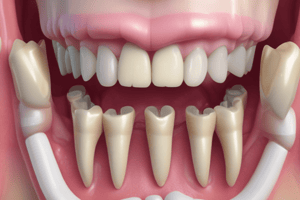Podcast
Questions and Answers
What is the main difference between gingivitis and periodontitis?
What is the main difference between gingivitis and periodontitis?
- Epical migration of junctional epithelium (JE) (correct)
- Presence of plaque
- Infection by bacteria
- Swelling of the gingiva
Which clinical feature is NOT associated with plaque-induced gingivitis?
Which clinical feature is NOT associated with plaque-induced gingivitis?
- Erythema of the gingiva
- Localized swelling
- Epical migration of JE (correct)
- Change in gum texture
What type of gingivitis affects only a single tooth or a small group of teeth?
What type of gingivitis affects only a single tooth or a small group of teeth?
- Chronic gingivitis
- Generalized gingivitis
- Localized gingivitis (correct)
- Diffuse gingivitis
Which classification does NOT apply to periodontal pockets?
Which classification does NOT apply to periodontal pockets?
What best describes diffuse gingivitis?
What best describes diffuse gingivitis?
Which of the following features is indicative of clinical attachment loss (CAL)?
Which of the following features is indicative of clinical attachment loss (CAL)?
What is the primary cause of plaque-induced gingivitis?
What is the primary cause of plaque-induced gingivitis?
What distinguishes a gingival pocket from a periodontal pocket?
What distinguishes a gingival pocket from a periodontal pocket?
What is one of the clinical features of plaque-induced gingivitis?
What is one of the clinical features of plaque-induced gingivitis?
Which change in color is indicative of gingivitis?
Which change in color is indicative of gingivitis?
What is a common symptom experienced by patients during brushing with gingivitis?
What is a common symptom experienced by patients during brushing with gingivitis?
What histopathological change occurs during the initial lesion of gingivitis?
What histopathological change occurs during the initial lesion of gingivitis?
What is the predominant cell type in the early lesion of gingivitis?
What is the predominant cell type in the early lesion of gingivitis?
What does the loss of stippling in gingivitis indicate?
What does the loss of stippling in gingivitis indicate?
Which type of gingivitis is characterized by localized inflammation?
Which type of gingivitis is characterized by localized inflammation?
What is a likely consequence of probing the gingival sulcus in patients with gingivitis?
What is a likely consequence of probing the gingival sulcus in patients with gingivitis?
Study Notes
Definition and Overview
- Plaque-induced gingivitis is inflammation of the gingiva without attachment loss, distinguishing it from periodontitis.
- Chronic periodontitis involves apical migration of the junctional epithelium (JE) and clinical attachment loss (CAL).
Clinical Features
- Clinical signs of gingivitis include:
- Changes in color from pale pink to bluish-red.
- Pitting edema, indicating fluid accumulation in gingival tissues.
- Loss of stippling, with smooth and shiny appearance due to deterioration of collagen attachment.
- Easy retraction of the gingiva due to destruction of fibers.
- Increased bleeding tendency upon gentle probing or during brushing.
- Discomfort or soreness of the gingiva, sometimes accompanied by an unpleasant taste.
Types of Gingivitis
- Localized gingivitis is confined to a single tooth or group of teeth.
- Generalized gingivitis affects the entire mouth.
- Diffuse gingivitis may involve the gingival margin and attached gingiva.
- Marginal gingivitis is situated along the gingival margin, while papillary gingivitis is verified at the interdental papilla.
Clinical Classification
- Clinical features can include:
- Changes in color due to vascularization and blood stasis.
- Pitting edema resulting from the extravasation of plasma fluid.
- Loss of stippling, which refers to the healthy appearance of gingiva when collagen fibers are intact.
- Signs of bleeding can result from probing or even biting into solid foods.
Histopathology of Gingivitis
- Three stages of histopathological changes:
- Initial Lesion (2-4 days):
- Increased vascularization with capillary permeability.
- Presence of serum proteins and few T-lymphocytes.
- Early Lesion (4-7 to 14 days):
- Significant infiltration of T-lymphocytes and macrophages.
- Basal cells of the junctional epithelium begin proliferation.
- Breakdown of dentogingival fibers occurs.
- Established Lesion:
- Further accumulation of immune cells, characterized by neutrophil migration through the sulcular epithelium.
- Initial Lesion (2-4 days):
Clinical and Histopathological Differentiation
- Students should be able to define key clinical and histopathological features of gingivitis and periodontitis.
- Importance of differentiating between periodontal pockets (depth of tissue loss) and gingival pockets (superficial inflammatory pockets).
- Classification of various types of periodontal pockets and understanding furcation involvement are vital for diagnosis and treatment planning.
Studying That Suits You
Use AI to generate personalized quizzes and flashcards to suit your learning preferences.
Description
This quiz covers the essentials of plaque induced gingivitis and chronic periodontitis, as taught by Prof. Hakem Hussein ElSayed. Students will explore definitions, clinical and histological features, classifications of periodontal pockets, and the correlation between pocket depth and clinical attachment loss.




